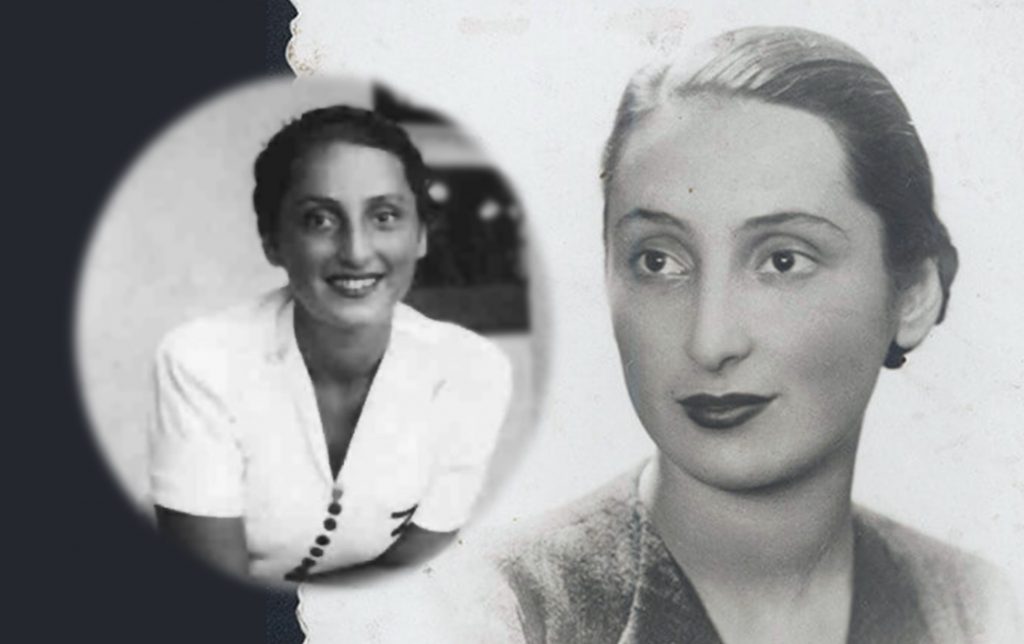Zuzanna Ginczanka (1917-1945)
It is difficult to imagine any discourse about Polish-language interwar poetry without the figure of Zuzanna Ginczanka. Born as Polina Gincburg in Kyiv in 1917, she became a resident of Rivne only a few months later as her parents moved there shortly after the October Revolution. Zuzanna spent her childhood years in Rivne. Her parents divorced when she was still a child. Her father emigrated to the United States of America, while her mother remarried and settled in Spain. Little Zuzanna was taken care of by her grandmother, Klara Sandberg, who owned a pharmacy in downtown Rivne at 132 Third of May Street. Zuzanna studied in the Tadeusz Kościuszko Gymnasium in Rivne, where she began publishing her first poems in the school newspaper Echa Szkolne. Her early poetic endeavors have come down to our time, thanks to these school publications. Their value is all the more significant, considering that Zuzanna published only one poetry collection in her lifetime, and all her drafts and manuscripts were lost or destroyed during the Second World War. In 1934, young Zuzanna participated in the Young Poets' competition organized by the Wiadomości Literackie, a Warsaw-based literary periodical. Her poem caught the attention of the famous Polish poet Julian Tuwim, who took the young poet under his wing for a long time.
After graduating from the gymnasium in Rivne, Zuzanna Ginczanka enrolled at the University of Warsaw to study pedagogy. However, she was unable to finish her studies due to antisemitic incidents. Despite this setback, Zuzanna remained in Warsaw, putting herself in the center of the literary life of the Polish capital. She published her first (and only) book of poems O centaurach ("About the Centaurs"), in 1936. Zuzanna gained increasing popularity in Warsaw literary circles thanks to her talent, charisma, and extraordinary beauty.
In the summer of 1939, Ginczanka came to Rivne for a brief stay but never returned to Warsaw because the Second World War broke out. The war immediately dealt a painful blow to the family of Ginczanka's grandmother: she lost her pharmacy as the Soviet authorities nationalized all the property of the Sandbergs. Zuzanna decided to move to Lviv, where, under Soviet occupation, she found ways to get published, work, and participate in the city's literary life, which was quite active at that time. She married the art historian Michał Weinzieher during this period in Lviv.
The beginning of the German occupation hit Ginczanka hard: she learned that her grandmother had died and was herself forced to go into hiding. Later, Zofja Chomin, the concierge in the building where Ginczanka lived, reported her identity to the Nazi authorities. Ginczanka wrote about this in her poem "Non omnis moriar," which has miraculously survived to our time and is widely known to readers. She managed to avoid arrest and, for a long time, used a false ID proving her alleged Armenian ethnicity. However, the risk remained too high, and she decided to move with her husband to Kraków, where she again frequently changed her place of residence and was forced to hide with her childhood friend Blumka Fradis for a while.
Meanwhile, the Gestapo arrested and shot Ginczanka's husband. Unfortunately, Zuzanna and her friend did not live to see the liberation of Kraków as, probably acting on someone's tip, the Gestapo found their hideout in January 1944 and arrested them. The exact circumstances of Zuzanna Ginczanka's death are not known. Still, many researchers assume that she was imprisoned for some time in Krakow, where she probably met her death, or was shot in the spring of 1944 in Plaszów, a concentration camp near Kraków.
Zuzanna Ginczanka was introduced to Ukrainian readers only relatively recently. With the support of Poland's Consulate General in Lutsk, a collection of her poems in Ukrainian translation was published in 2017 to mark the 100th anniversary of her birth. There is also a plan to install a memorial plaque to Ginczanka in Rivne.
... There's nothing left of your face. Only features, an outline,
Nothing but a shadow of your face of old.
As if startled, clouds of memories scatter in the sky,
Revealing the dear features for me to behold.
(Fragment of Zuzanna Ginczanka's poem "Epitaph")
Translated from the Ukrainian by Vasyl Starko.




















